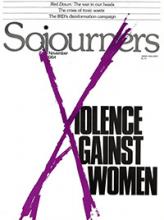Woza means rise up in Sotho. I learned that on a September Saturday when I went to see Woza Albert!, an extraordinary play from South Africa.
The play is about what happens when Jesus Christ chooses South Africa for his Second Coming. The white South African regime quickly tries to make propaganda from the Savior's appearance on South African soil. The regime's attempt to control the situation works about as well as the heretical theology it uses to justify its apartheid system. Morena, the Savior, identifies instead with the oppressed majority, and the lives of ordinary people are filled with hope.
The rich portrayals of these South African lives and their response to the coming of Morena form the heart of the play. I laughed, cried, and felt the tangible power that hope can bring to the circumstances of injustice and despair.
Read the Full Article

